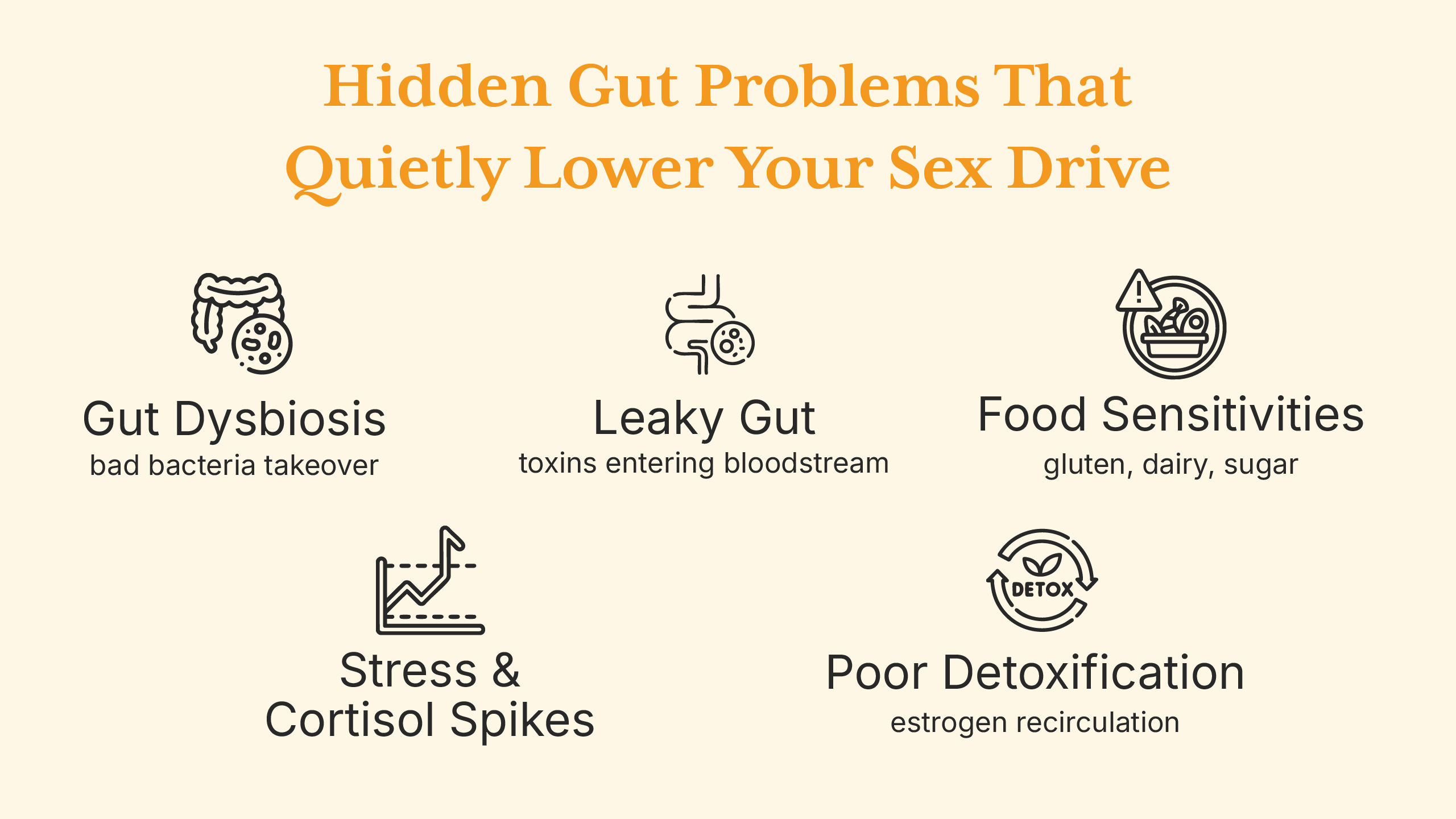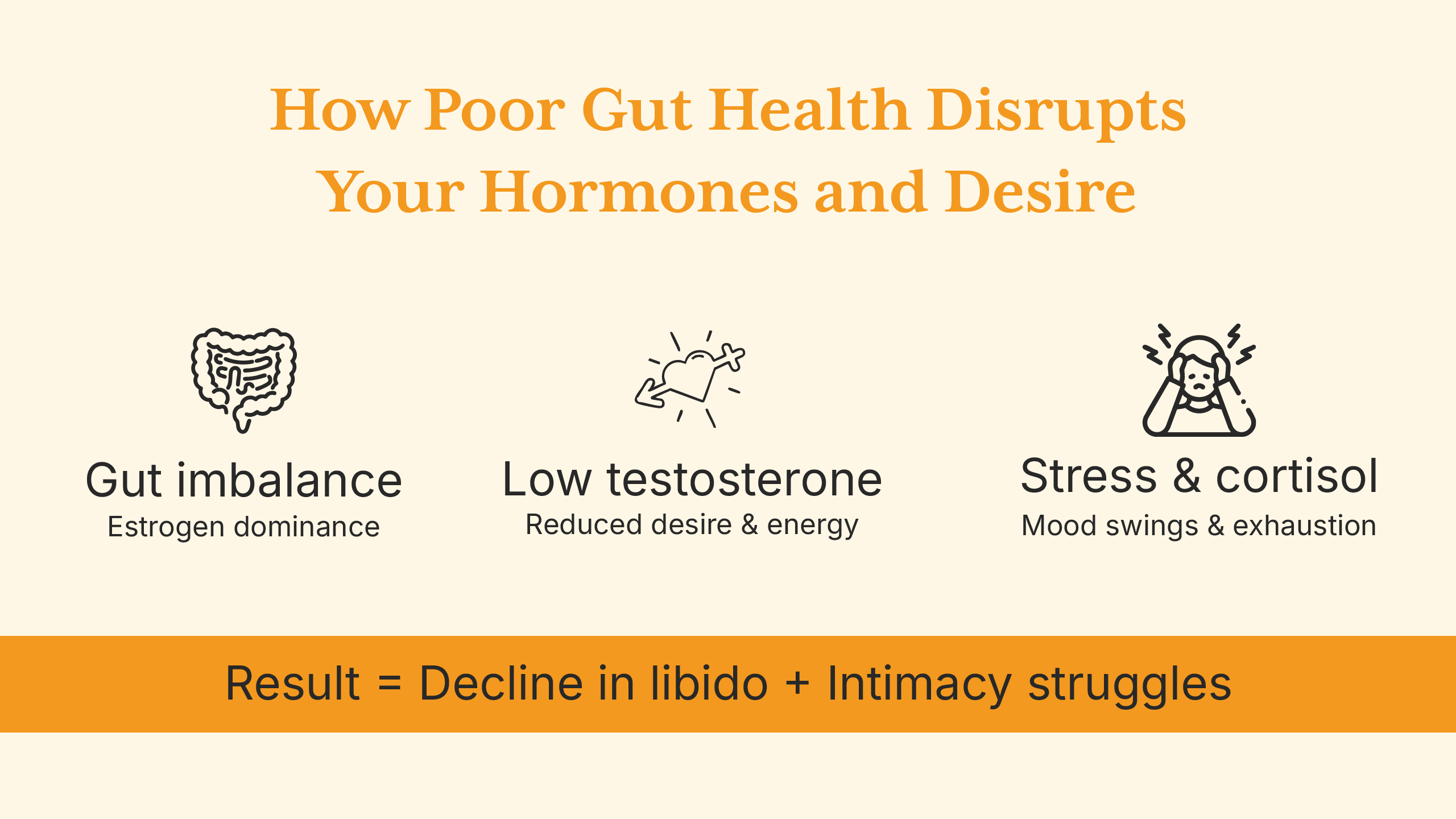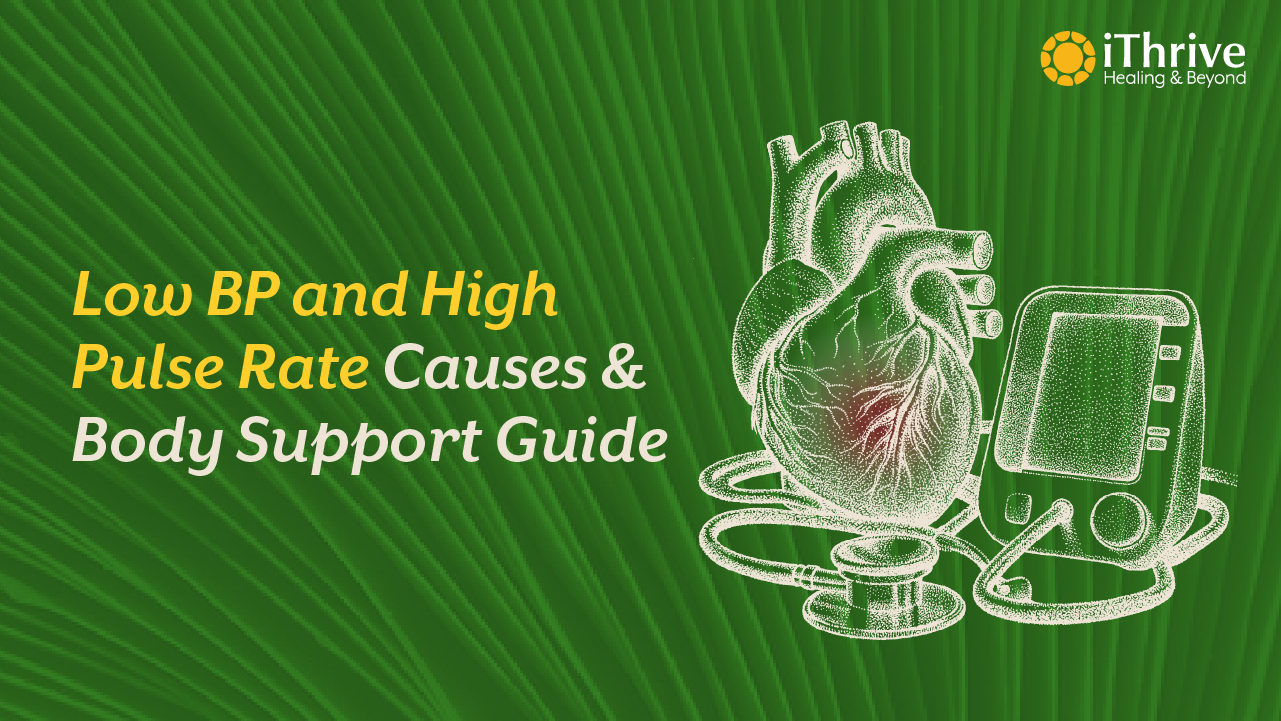We often link sex drive with hormones, stress, or emotional attachment. However, your gut health is a significant factor that is often overlooked.
Food digestion is not the only function of your gut. It is essential for the production of neurotransmitters, hormone regulation, inflammation management, and the absorption of vital nutrients, all of which have a direct impact on your innate desire and sexual health.
Perhaps you're wondering:
How does intimacy relate to digestion?
Can poor gut health impact my mood and desires?
Could poor gut health be the root of my recent "off" feeling?
The science behind the intriguing relationship between your gut and libido, as well as any hidden imbalances that may be hindering your energy, mood, and intimacy, will all be covered in this blog.
The Impact of Gut Health on Hormones and Desire
Your sex hormones, including progesterone, estrogen, and testosterone, don't function independently. For them to remain balanced, a healthy gut is necessary.
When your digestive tract is upset or inflamed, it can:
- Alter the way your body breaks down and eliminates hormones
- It causes estrogen dominance, which is an accumulation of estrogen.
- Reduced levels of testosterone
- Cause mood swings, exhaustion, and a lack of desire
Sexual Health and Nutrient Absorption

Your gut isn’t just about breaking down food; your gut is also responsible for absorbing the nutrients your body needs to support mood, energy, hormones, and sexual health.
A poor gut can prevent the absorption of vital vitamins and minerals, even if you're eating a healthy, balanced diet. This can eventually result in hidden deficiencies that impact your motivation, endurance, and general health.
These are some essential nutrients for a healthy sexual life, and how your gut plays an important role:
Zinc
Zinc is essential for sperm health, testosterone synthesis, and hormonal balance in general. Particularly in men, low zinc equals low libido.
Magnesium
Magnesium Supports blood flow, mood, and muscle relaxation, which is essential for arousal and connection, and aids in the regulation of cortisol, your stress hormone.
B6 and B12 vitamins
The nervous system and hormone synthesis are supported by these B vitamins. These vitamins and minerals are also helpful in the production of neurotransmitters like dopamine and serotonin, which are vital for mood and desire.
Vitamin D
Often referred to as the "sunshine vitamin," it is crucial for testosterone levels and mood regulation. Many people, particularly those with autoimmune or digestive disorders, are deficient in this vital nutrient.
Even if you are taking supplements and eating the right foods, your gut may not be able to absorb these nutrients if it is an inflamed or imbalanced gut helath. This can subtly deplete your body's energy and suppress your innate desire.
How Your Gut Affects Your Mood, Energy, and Intimacy

Your gut and brain constantly communicate through what’s called the gut-brain axis. Your gut communicates well with the brain when it is in good health. However, when it's out of balance or irritated, it can send distress signals that impact your motivation, desire, and mood.
An upset stomach may result in:
- Feeling depressed, disconnect or lack of motivationdue to low serotonin and dopamine levels
- Depression and anxiety have a direct impact on desire and the capacity to feel connected or close.
- Inadequate sleep can leave you feeling exhausted, agitated, and moody.
- Prolonged exhaustion can deplete your vitality for intimate physical and emotional contact
Therefore, your gut might be the missing piece if you've been feeling emotionally flat, disengaged, or just "not in the mood," and you're not sure why.
How Gut Inflammation Can Quietly Lower Your Desire and Energy
Although it's not always evident, inflammation in the body can significantly affect your emotions, including your innate need and drive for closeness.
An imbalance in your gut can lead to low-grade, chronic inflammation that spreads throughout your body. Your hormones, blood flow, and stress response, all essential for sustaining a healthy sexual life are impacted by this inflammation.
This is how it operates:
Elevated Cortisol
Your stress hormone, cortisol, is elevated when inflammation occurs. Chronically elevated cortisol disrupts your body's natural rhythm for arousal, connection, and desire while also lowering testosterone.
Disrupted Blood Flow
Reduced sensation and responsiveness can result from inflammation's ability to constrict or narrow blood vessels, which limits blood flow to vital organs, including the sexual organs.
Mood and Exhaustion
Chronic inflammation frequently results in exhaustion, depression, disorientation, and a lack of drive, leaving little energy for interpersonal contact.
Inflammation of the gut may be the cause of your frequent bloating, gas, post-meal discomfort, or exhaustion. And your intimate life might already be being impacted by that inflammation without you even being aware of it.
So What’s Really Causing the Disruption?
The following are the most typical gut-related causes of low desire and hormonal imbalances:
Unbalanced gut bacteria, or gut dysbiosis
Trillions of bacteria, some beneficial and some detrimental, live in your gut. The harmful bacteria take over when this equilibrium is upset (by processed foods, antibiotics, long-term stress, infections, inflammation, alcohol, smoking, enviornmental toxins or any underlying gut conditions).
Your mood, energy, and intimacy levels may suffer as a result of this imbalance, which also causes inflammation, poor digestion, weakened immunity, and disturbed hormone production.
Intestinal Permeability, or Leaky Gut
The lining of your stomach is designed to function as a filter, allowing nutrients to pass through while blocking toxins. However, the lining becomes excessively porous when it is damaged.
Particles of undigested food, bacteria, and toxins begin to seep into your blood. This sets off an immunological reaction, exacerbates inflammation, and throws your hormone system into disarray, particularly affecting the balance of estrogen and cortisol.
Persistent Stress
One of the main, unseen factors affecting gut health is stress. It changes the microbiome, lowers stomach acid and digestive enzymes, and weakens the gut lining.
Additionally, it causes your body's main stress hormone, cortisol, to rise, which directly suppresses your libido, emotional connection, and hormonal balance.
Unknown Food Sensitivities
Even so-called "healthy" foods may be causing your body to react. Gluten, dairy, soy, corn, and processed sugars are common offenders.
Your natural desire and energy can be affected by these sensitivities, which can subtly cause inflammation in your gut, leading to bloating, fatigue, mood swings, and hormonal imbalances.
Inadequate Detoxification Routes
Together, your liver and gut eliminate excess hormones like estrogen and toxins. However, these hormones can recirculate in the body when detox pathways are overburdened or slow.
In addition to low desire and disturbed reproductive health, this can result in estrogen dominance, exhaustion, and skin breakouts.
What Can You Do?
Your body might be lacking vital support if you haven't had the energy, mood, or desire lately.

Supplementation
Giving your nervous system, hormones, and gut the nourishment they require to operate at their best is a good place to start. Core supplements such as:
- Magnesium: to reduce tension and enhance sleep. Try iThrive Essentials Magnesium Bisglycinate, which has 10% Elemental Magnesium Bisglycinate in every scoop and is the most absorbable, gut-friendly form.
- B-Complex: for healthy brain function and hormonal balance. Try iThrive Essentials Active B-Complex powered by 8 essential B vitamins in their active forms, plus brain-boosting choline (from non-GMO sunflower lecithin) and inositol for mood & nerve support.
- Vitamin D3 + K2: for hormonal and emotional balance. Try iThrive Essentials Vitamin D3 + K2 Drops crafted with plant-based D3 (cholecalciferol) and bioactive K2, this liquid formula ensures smart calcium direction from bloodstream to bones.
- Zinc: to boost testosterone and immunity. Try iThrive Essentials Zinc Defense. Chelated Zinc for maximum absorption, combined with powerful cofactors like Copper and L-carnosine
- Detox Binders: a way to rid your gut and hormones of toxins. Try iThrive Essentials Detox Binder, formulated to trap and eliminate heavy metals, pathogens, and environmental toxins from your body.
- Probiotics: To reset your gut and support hormone metabolism. Try iThrive Essentials Probiotics with prebiotics, which has 16 different strains (including 2 strong types: B. coagulans & B. subtilis) and prebiotics to fully support your gut health.
Root Cause Analysis
However, it might be time to look further if you've tried simple solutions and are still having problems.
This is where thorough testing is useful. Knowing the particular imbalances in your body frequently necessitates:
- A comprehensive blood panel that considers more than just standard tests
- Hormone markers and the gut microbiota
- Status of vitamins and minerals
- insights into the detox pathway, inflammation, and infections
This type of in-depth research helps identify the true cause of the issue, allowing you to stop speculating and begin healing with a focused strategy.
We at iThrive specialize in Root Cause Analysis (RCA), which is a thorough examination of your hormones, gut health, blood markers, and lifestyle habits to determine the true cause of your symptoms. Rather than covering up problems, we assist you in comprehending the "why" behind them and creating a customized healing strategy that truly works.
Schedule Your RCA with Us to start down the path to genuine, long-lasting recovery.
Subscribe to our newsletter and receive a selection of cool articles every week





.png)


.webp)

.jpg)
.jpg)










